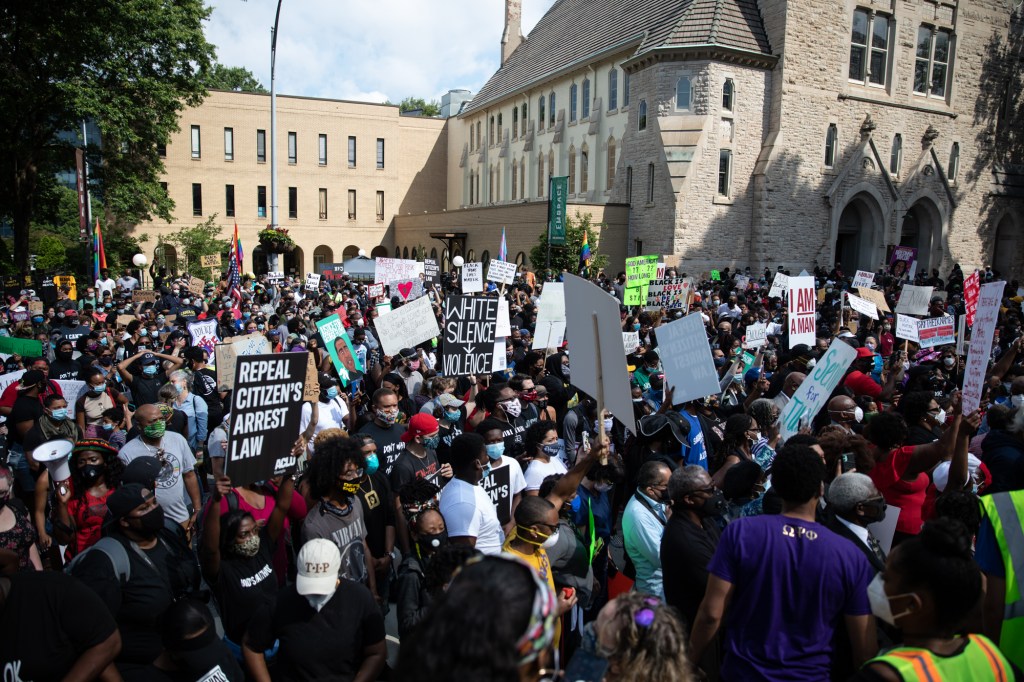Senate panel squashes bill that opponents say targeted protesters
Published 1:00 pm Wednesday, March 3, 2021

- Protesters crowd in front of the Georgia State Capitol on June 15 demanding lawmakers take legislative action as they reconvene after a three month hiatus.
ATLANTA — A state Senate committee squashed a bill that would have made blocking traffic during a protest a felony after strong opposition from civil rights groups and counties.
The Senate Judiciary Committee, chaired by Rep. Brian Strickland of McDonough, heard testimony on the bill Tuesday but did not bring it to a vote Wednesday — a move that killed the bill.
The legislation would have needed to pass out of committee and a vote on the Senate floor before Crossover Day, March 8, to continue through the session.
Last summer, Atlanta joined nationwide protests calling for racial justice and an end to police brutality. Thousands poured through the streets of downtown every day for more than a month in response to the killings of George Floyd, Rayshard Brooks, Ahmaud Arbery and others.
Republican Sen. Randy Robertson’s bill would have heightened penalties for harming another person or damaging property during protests as well as make it a felony for crowds to block a highway.
Civil rights organizations decried the measure during a committee hearing Tuesday, saying it blatantly violates First Amendment rights.
“I felt that it was necessary after witnessing things that occurred in Seattle, Portland, Atlanta and most recently in our own Capitol,” said Robertson, a retired law-enforcement officer. “That maybe it was time that we looked at and redefined what peaceful assemblies were and we defined what non-peaceful assembly were.”
The legislation would have made it a felony for an individual to “knowingly participate” in a protest that leads to the destruction of property or injury.
Blocking a highway or street during a protest would have been a felony and punishable of one to five years in prison and up to a $5,000 fine.
“I contend that a significant governmental interest is not only the protection of the citizens that live in the community where the assembly is held but also to every single business owner private property owner within that city, too,” the Cataula lawmaker said.
The bill is one of a few introduced this session that boosts support for law enforcement. But the pro-police bills come on the heels of a new hate crimes law in Georgia and an effort to repeal the state’s citizen’s arrest statute.
Isabel Otero, a policy associate with the Southern Poverty Law Center, testified that the bill would “undoubtedly trigger a variety of constitutional challenges” and seeks to “target” protesters.
“SB 171 really does look like the kind of Jim Crow relic that this body is trying to repeal in other places with the repeal of Georgia citizens arrest law,” she said.
Christopher Bruce, political director of the ACLU of Georgia, said the legislation “seeks to scare” Georgians from exercising their right to free speech and assembly.
“Throughout history, we have seen who suffers the gravest consequences when police are encouraged or permitted to take drastic response in their interactions with civilians who are exercising their First Amendment rights,” he said. “Especially in the context of civilians protesting for justice and equality.”
Civil rights groups were not the only opponents of the bill. The Association of County Commissions of Georgia, which represents Georgia’s counties, spoke against measures that would put local governments on the hook for damage to property during protests and cutting funds to their law-enforcement agencies.
The bill includes a provision that allows the state to withhold funds from local governments that choose to reduce their law-enforcement budgets by 30% or more. This kind of legislation has been seen in other bills this legislative season that aim to curb efforts to defund police departments.
Larry Ramsey, with the association, said control of budgets is ultimately in the hands of county leadership.
“The voters in each county have elected the county commissioners to make these decisions and they’re tough decisions,” he said.
Ramsey said provisions within the bill open the potential for counties to face litigation after protests.
“We don’t like the idea of opening the flood gates of litigation anytime someone is injured or property damage by an assembly of two or more people,” he said.


